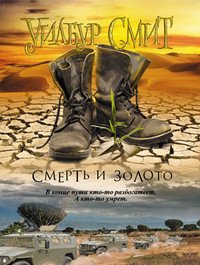Men of Men - Smith Wilbur (онлайн книга без txt) 📗
It would have been a tedious task to hunt them out of the dark belly of the hills, so they had packed every entrance to the underground passages with branches of mopani trees and then put in fire. At the end some of the Mashona had run out through the flames, living torches of shrieking flame.
"Fire is a bad way to die," said Kamuza, and uncorked his own snuff-horn.
"And five hundred pieces is a great deal of gold," one of his friends answered him across the fire.
"Does a son steal the calves from his father's herd?" Bazo asked them, and now they were shocked indeed. To the Matabele the great herds of cattle were the nation's wealth, and the harsh laws and penalties that governed the management of the herds they had learned as part of their existence as "mujiba", the apprenticeship as herd boys which every Matabele boy must serve.
"It is death even to squirt the milk of another man's cow into your mouth," Bazo reminded them; and they all remembered how they had taken that chance at least once in the solitude of the bush, spurting it directly from the teat so that it dribbled down their chins onto their naked chests, risking their lives for a mouthful of warm sweet milk and the respect of their peers.
"It is not a calf," Kamuza reminded, "but a single little stone."
"Gandang, who is my father, looks upon the white man Bakela as a brother. If I take anything from Bakela, then it is as taking from my own father."
"If you take this stone to Bakela he will give you a single coin. If you take it to the Bastaard he will give you five hundred."
"It is a heavy matter," Bazo agreed. "I will think on it."
And long after all the others had curled on their reed sleeping-mats under the karosses of fur, he sat alone over the dying fire with the great diamond burning coldly in his right hand.
Three men rode into Zouga's camp that Monday morning, and Zouga stooped out of his tent to meet them, standing bareheaded in the sunlight.
Neville Pickering led the party, and as he stepped down from the stirrup, he said, "I hope we do not disturb you, Major, but I'd like you to meet some friends of mine."
"I know mister Hayes." Zouga shook the hand of the lanky Texan engineer and then turned to the third man.
"And of course I know mister Rhodes by sight and reputation."
Rhodes" hand was cool, the skin dry and the knuckles large and bony. It had the feel of strength, although his grip was quick and light. Zouga found the pale blue eyes on a level with his. The man was tall, and startlingly young, he could be very little older than twenty, young to have earned such a formidable reputation.
"mister Rhodes." Nobody, not even Pickering, used his Christian name. It was said he even signed his letters to his own mother "Your affectionate son, C. J. Rhodes".
"major Ballantyne." Zouga was startled again, for Rhodes had a slight voice, pitched high and with a breathless quality. "I am delighted to meet you at last. Of course, I have read your book, and there are many questions I should like to ask you., "Jordan, take the horses," Zouga called, and began to lead his guests towards the scant shade of the camelthorn tree. But Rhodes paused as Jordan scurried from the tent, obedient to his father's order.
"Good morning, young Jordan," he said, and the child stopped abruptly and stared up at him speechlessly, beginning to blush a deep pink with transparent heroworship, overcome at being recognized and addressed by name.
"I see you have taken to reading rather than fisticuffs now."
In his haste Jordan still carried a book in his hand.
Rhodes stooped and took it from him.
"Good Lord -" he said. "Plutarch! You have cultivated taste for one so young."
"It's a fascinating book, sir."
"Indeed it is, one of my favourites. Have you yet read Gibbon?"
"No, sir," Jordan whispered shyly, the blush subsiding to leave him only faintly pink. "I do not know where I could find a copy."
"I will lend you one, when you have finished this." He handed the battered dog-eared copy of Plutarch's Lives back to Jordan. "Do you know where my camp is?"
"Oh, yes, mister Rhodes."
Every day of his life Jordan made a detour on his way back from his lessons in the church, a detour that passed the tented and thatched camp where Pickering and Rhodes kept a bachelor mess, and Jordan passed with dragging footsteps. Twice he had glimpsed his idol at a distance and each time overcome with shyness had scampered away.
"Good. Call in when you are ready for it." For a moment longer he studied the angelic child, and then turned and followed the other men to the shade of the tree.
There were empty packing cases and logs to sit on, and the four men arranged themselves in a casual circle.
Zouga was relieved that it was too early to offer his guests liquor. He had barely sufficient money to buy food for his family, let alone to afford whisky, and he guessed that a bottle would not last long in this company; all three guests were drinking men.
They sipped coffee and swapped the news of the settlement for a few minutes before Pickering brought up the real business of their visit.
"There are only two schemes we have come up with to get the number 6 area back to work," he said. "The first is the ramp "I'm against that," Rhodes said brusquely, impatiently.
"Within months we'll be back at the same problem, just too damned deep!"
"I would agree with mister Rhodes," said Hayes, the engineer. "At best it would be only a temporary measure. Then the ramp itself would start collapsing."
"Major Ballantyne's idea is the only one worth considering," Rhodes cut in, and Zouga was struck forcibly by the man's manner of cutting through unnecessary discussion and getting to the core of a problem. "The idea of building stagings on the rim of the workings, and running wires to the floor of the diggings is the only one that will beat the problem of depth. Hayes, here, has done some drawings."
The engineer unrolled the plans he carried, spread them on the dusty earth at his feet and anchored the corners with diamondiferous pebbles from Zouga's tailing dump which had spilled into and was threatening to engulf the entire camp.
"I have considered a cantilever design." Hayes began to explain the drawings in crisp technical terms, and the others moved their seats closer and bowed over the plans. "We will have to use hand winches, and perhaps horse whims, until we can get a steam engine to do the haulage."
They discussed it quietly, asking penetrating questions and, when the answers were obscure, cutting down for them with sharp minds and quick words. There was no waste of words, no repetitions, no drawn-out discussion and the work went swiftly.
The stagings would be tall scaffoldings built on the edge of the pit, and they would house the haulage winches.
"We will have to use steel hawsers. Manila will never do the job," Hayes told them. "There will have to be a single wire to each individual claim. A lot of wire."
"How long to get it out?"
"Two months to Cape Town."
"How much is this going to cost?" Zouga asked the question which had been burning his lips all morning.
"More than any of us can afford," smiled Pickering. A man with a thousand guineas in his pocket was a rich man on New Rush in these days.
"What we cannot afford is not to do it," Rhodes answered him without a smile.




